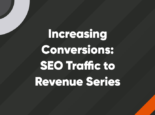
What’s a Good Organic Clickthrough Rate?

A fundamental part of SEO is optimizing website pages to rank higher in SERPs. But even if a page is ranking in the top position, it's not going to do you much good if no one is clicking through to your page.
Measuring organic clickthrough rate is important to understanding the overall relevance of your content for any given keyword, and it can help you determine optimizations to make to your site pages to improve clicks. It's a metric that provides a holistic understanding of the impact of your SEO strategy.
Understand the factors that influence CTR along with how to improve CTR to maximize your content marketing and SEO efforts.
What is organic CTR?
Organic CTR is the percentage of users who click on an organic search engine result and land on that page. It can give you a pretty good indication of how relevant your page is to a given query – and how useful your audience finds that page once they click on it.
Here is the formula for calculating clickthrough rate:
Organic clicks / total impressions = organic CTR
Expected CTR based on position in SERPs
Determining a good clickthrough rate benchmark will be heavily influenced by your page's position in SERPs. If you are ranking in a low position for a given keyword, you can't expect to have a high CTR.
A study from Ignite Visibility dug into expected CTR by ranking position in Google. Here are a few expected CTRs based on page position in SERPs:
Position 1 – 43.32%
Position 2 – 37.36%
Position 3 – 29.90%
Position 4 – 19.38%
Position 5 – 10.95%
Position 6 – 10%
Position 7 – 5.28%
Position 8 – 4.13%
Position 9 – 4.13%
Position 10 – 3.11%
Of course, these numbers can fluctuate over time and can be influenced by a number of things, but overall provide a solid benchmark to work toward when making efforts to increase CTR.
You can see from these results the importance of rank and its correlation with CTR. When you rank higher, your CTR should positively reflect that.
Why should you measure CTR?
Measurement is a crucial part of digital marketing. When investing resources like time, energy, and money, it's important to understand the results to determine what's working and what's not, and to identify areas for improvement.
When it comes to organic metrics, understanding how your website content is performing is only one piece of the pie, but it's a pretty important slice. You need to understand not only how many people are clicking through to your content, but why that number might be low compared to competitors along with how to boost it to drive more traffic to your site. After all, if you're creating great content but no one is seeing it, you probably need to reevaluate something. And if you've made optimizations but aren't seeing results, you can start to rule things out and optimize other areas.
Clickthrough rate might not seem like the most important metric to measure because it can't tell you about the quality of traffic, but it can show you how relevant your content is to users for a given query, which can inform your content strategy and overall approach toward increasing traffic.
What influences CTR?
As mentioned above, when it comes to organic search, CTR depends on how high your page is ranking in SERPs. If your web page isn't ranking among the top 10 results, your CTR will probably be pretty low, which indicates the need for prioritizing SEO to grow your website's visibility.
But ranking position isn't the only factor that plays into CTR. A large part of CTR also comes from the quality and relevance of your content, the keywords you're trying to rank for, and how well you've optimized your content for search. In other words, the same tactics that will help you rank higher will also help to increase CTR. You need to understand what your audience is looking for and how to bring them through the funnel with your content.
Competition
Competition and industry can be large determinants of CTR. If there are a lot of high-quality websites in your industry that are outranking you on Google or are providing better information, you'll probably have a much lower clickthrough rate.
Plus, some industries naturally have higher CTRs than others, like software, finance, and insurance. Users searching for information in these industries are often looking for specific information, resulting in a higher CTR.
Quality and relevance of your content
Creating unique, high-quality content can also influence CTR. If you're writing a blog that shares the same information as the 3 highest-ranking blogs for a given keyword, your blog won't make a dent. But if you can add unique value that the top-ranking pages don't offer, you'll be much more likely to succeed.
Search volume
There's also the issue of search volume. If no one is looking for your product or service, your site won't get discovered. There is some level of awareness that has to be established before you can start ranking for branded keywords and showing up in searches, and in turn, seeing a spike in CTR.
Search volume can dip from month to month depending on seasonality and other factors, so just know that your CTR can fluctuate, too.
Search intent
Search intent is a big factor that can influence CTR, which is why it's so important to understand what your audience is looking for when they're searching and to optimize your content for the right keywords. For example, if you're trying to rank for the "top Minneapolis SEO agencies" with a blog post on SEO best practices, you're neglecting the fact that the user's intent is to discover service pages for local agencies rather than to obtain information about SEO.
Understanding search intent can help inform your content strategy, allowing you to find keywords that will make your content relevant to search queries.
SERP features
The are a number of features located on SERPs that are meant to improve user experience but can drastically impact your page's CTR, including Google Ads, Featured Snippets, People Also Ask, Related Searches, Reviews, FAQs, Knowledge Panels, images, videos, etc. Many of these features will display before organic results, which can influence your page's CTR.
If your result shows on a page with only standard search results, you'll see a much higher CTR than you would on a SERP that shows additional features; if users find what they're looking for at the top of the page without having to click into a result, they'll probably drop their search and pay no regard to your organic result.
It's important to consider which results get added to the SERP features and how you can leverage those placements for your own site.
How to improve CTR
Remember that when you're thinking about how to improve CTR, your goal is to entice searchers to click on your site. You need to make your site as appealing and helpful as possible to your target audience. Here are a few quick, actionable steps to improve CTR by optimizing your content:
Schema
Edit your schema markup to provide additional context to what a web page is about so that users can see the relevance of your content and decide to click.
Meta description
Offer a preview of what your page will cover in the meta description. Ensure it's well-written, optimized with your focus keyword, and concise.
Title tags
Optimize your page title tags by including a keyword or two and providing insight into the topic of your page.
URLs
Edit your URLs to include relevant keywords that can help a user understand page content and convince them to click.
Long-tail keywords
Take advantage of long-tail keywords! They're easier to rank for and tend to help you locate a highly-relevant audience.
Start driving results with Perrill
At Perrill, we prioritize making decisions that are driven by data. We know just how important it is to see meaningful results, especially when it's your time and money on the line.
If you're ready to discuss an SEO strategy custom-fit to your unique business needs, reach out.

Grace Hallen
Author
Grace Hallen
Categories
Date
Explore with AI
Join Our Newsletter


Why Google Shouldn’t Reveal Its Search Algorithm


8 Signs You Need a Website Redesign


